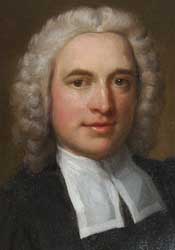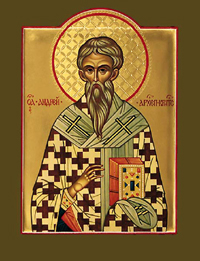 “The night is far spent, the day is at hand: let us therefore cast off the works of darkness, and let us put on the armour of light” (Romans 13:12).
“The night is far spent, the day is at hand: let us therefore cast off the works of darkness, and let us put on the armour of light” (Romans 13:12).
Almighty God, give us grace that we may cast away the works of darkness, and put upon us the armour of light, now in the time of this mortal life, in which thy Son Jesus Christ came to visit us in great humility; that in the last day, when he shall come again in his glorious Majesty, to judge both the quick and the dead, we may rise to the life immortal; through him who liveth and reigneth with thee and the Holy Ghost, now and ever. Amen (Collect for the first Sunday of Advent).
These clothes are called “armour,” because our condition in this world is a warfare, a continual war against the world, the flesh, and the devil, and our calling is that of soldiers; and has been so ever since that time, when we were sealed “with the sign of the Cross, in token that we were to fight under Christ’s banner, and to continue His faithful soldiers.”
Now what this Christian clothing, or armour of light is, we know from other places of Holy writ. There is “the shield of faith;” entire belief in the great things out of sight.
There is “the helmet of salvation;” hope, that through Christ we may be saved, on our true repentance and dutiful obedience. There is the “breastplate of love” and true charity, to guard our hearts from evil and selfish desires.
There is “the sword of the Spirit, that is, the Word of God;” His holy commandments, deeply fixed in our heart, and always ready for our use, that by the remembrance of them we may put away proud, unkind, impure, foolish imaginations.
This is the armour of light: these are the portions of a Christian man’s armour, which lie, as it were, by his bedside, when he awakes in the morning, and which Christ expects him to put on, as he would his clothing, to prepare himself for the duties of the day.
How is he to put it all on? By good thoughts and good resolutions; considering beforehand what he will have to do that day; what temptations he is likely to meet with, and how he may best prepare against them. And this cannot be, without earnest prayer; therefore the Christian warrior will be very punctual and very attentive in his morning prayers.
And when this time of Advent comes, which is so far like the morning, in that it is a new beginning, the Church opening her new year, we shall, if we are wise, be yet more diligent than usual in attending to our Lord’s call, throwing aside all encumbrances, girding on our armour, and saying our prayers.
Too much reason have we, most of us, to look upon the time past as a night, wherein we have been either asleep, or doing what we were ashamed of.
Yet, if we will so use it, this Advent may prove to us a blessed morning; we may, if we will, wake up at the call of our Saviour, and begin dressing ourselves, and doing His work.
John Keble (1792-1866; Church of England): Sermon XXIV: The Advent Collects, I, in Sermons for the Christian Year, Advent to Christmas Eve @ Lectionary Central.
One Response »
 And can it be, that I should gain
And can it be, that I should gain













